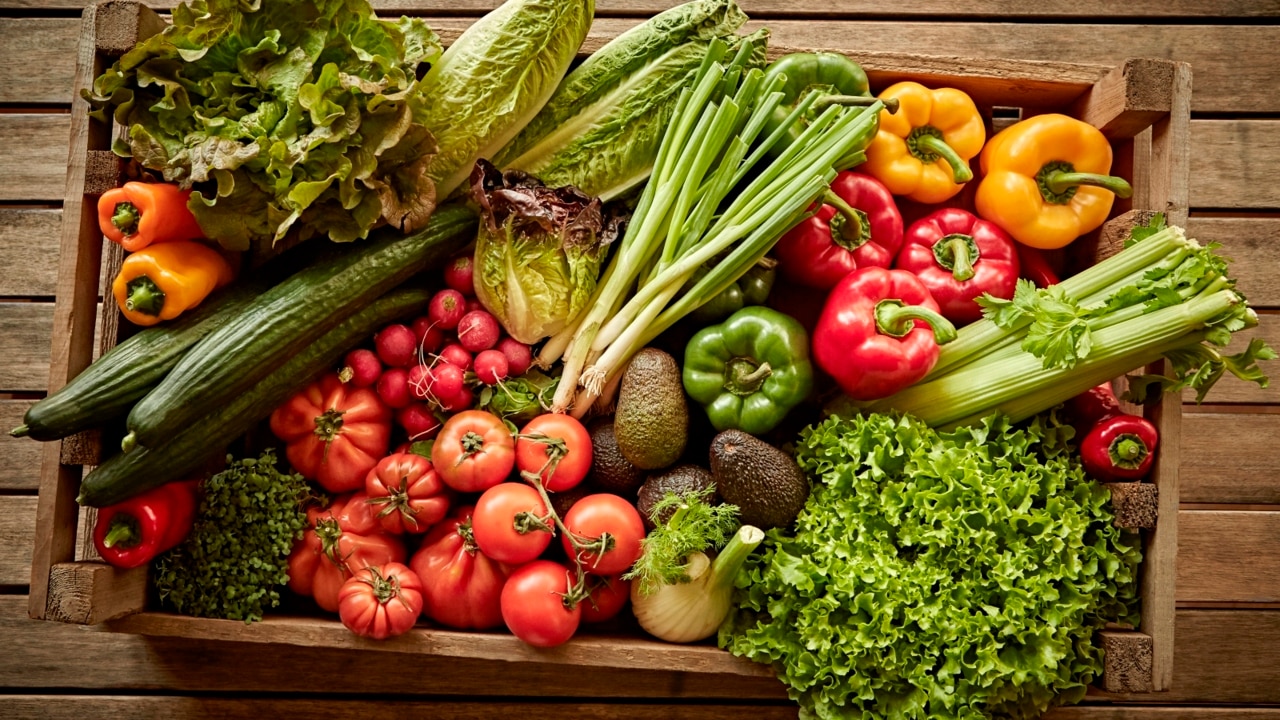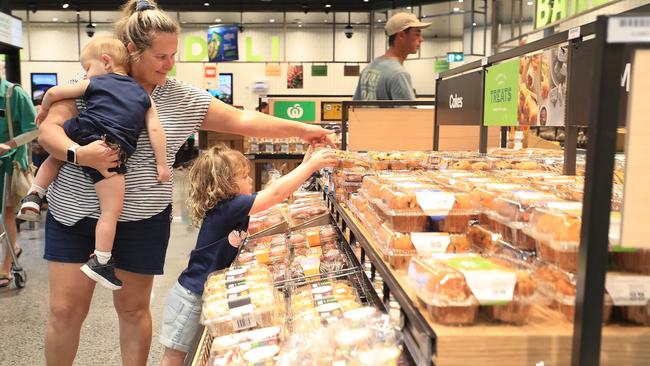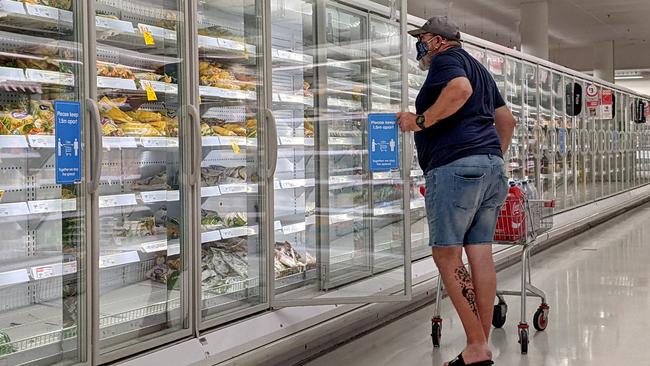Food prices up by 10 per cent at Coles and Woolworths, rising faster than inflation
Australians are continuing to be slugged by soaring food costs, according to a new report, although one supermarket giant has disputed the findings.

Business
Don't miss out on the headlines from Business. Followed categories will be added to My News.
Food and grocery prices at Australia’s two supermarket giants Woolworths and Coles have surged by a whopping 9.6 per cent in April, according to a new report.
Common grocery items including Vegemite, peanut butter and yoghurt have soared higher in cost compared to overall inflation of 7 per cent, the report from investment bank UBS also found.
The analysis of more than 60,000 items at the supermarkets, which has been disputed by Coles, found the 9.6 per cent price increase to groceries had hit a new high.
It also sparked fears that there was no relief in sight for Australians struggling with rising food costs and other cost of living pressures.
Fresh food, in particular, contributed to the huge increase in prices as costs skyrocketed by 9.9 per cent – however UBS predicted this would drop in the coming months as supply levels improved.
A Coles spokesperson said the UBS’s report was “not an accurate reflection” of how the supermarket giant calculates and reports inflation.
“UBS’s sample data does not capture our full range of products and does not capture changes in customer buying behaviours which impact our sales volumes and product mix,” they said. “This is integral to capturing an accurate reflection of overall supermarket inflation. UBS used the same price tracker for a report ahead of the third quarter 2023 results and reported Coles’ inflation at 9 per cent.
“Our official inflation figure was reported significantly lower at 6.2 per cent.”
A Woolworths spokesperson said the supermarket chain recognised that cost of living pressures are being felt by its customers and team and it continued to help them save each time they shop.
“We ensure all of our customers can get their Woolies worth via our thousands of weekly specials, our seasonal prices dropped programs, a vast range of our quality own-brand products at low prices, and Everyday Rewards to help customers’ shops go further,” they said.
“In our last quarterly results we saw that value-conscious customers are becoming more thoughtful about their discretionary spend, trading into more affordable options such as our own-brands and looking for additional ways to save in store or through our digital, rewards and e-commerce platforms.”

The report found that breakfast staples such as dairy goods and spreads have also climbed by a mammoth 13 per cent in the past year with UBS analysts warning the country was facing “materially high food inflation”.
Dry goods were up by 9.4 per cent with popular shelf products recording marked increases, such as Vegemite rising in price by 8 per cent, Bega peanut butter up 9 per cent and some types of yoghurt up 12 per cent.
“Dry grocery inflation is likely to remain elevated as pressures on commodities and the domestic supply chain including labour continue in 2023, although the frequency of price rises may reduce,” the analysts found.
“High inflation has driven a shift to private label at Coles and Woolworths … with this trend likely to continue given rising cost of living pressures.”

However, meat-eaters scored a win with chicken prices – which have climbed 10 per cent in the past year – dropping by 1 per cent last month, while pork is also 4 per cent cheaper.
UBS analyst Shaun Cousins described the increasing rate of food inflation as a “surprise” and attributed the high prices to supply chain and labour costs.
“While monthly pricing data is volatile, especially fresh, given supply variability, it is valuable given the current period of materially high food inflation,” he said.
“The increasing rate of food inflation is a surprise, and inconsistent with the declines reported by Coles and Woolworths in the third quarter.”
The report found Coles is now ahead of Woolworths with its inflation up 10.5 per cent in April against 9.1 per cent in March.
Meanwhile Woolworths’ food inflation registered an 8.7 per cent growth in April and 9.7 per cent in March.

The Coles spokesperson added they could not comment on April inflation ahead of the financial year 2023 results in August.
In late April, outgoing Coles boss Steven Cain said inflation was starting to moderate and reported that the total price inflation of 6.2 per cent slowed in the third quarter, compared to 7.7 per cent in the second quarter.


Woolworths added it was dropping the prices of more than 450 winter essentials including chicken, corned beef, soup and pasta from May 24 until August 22.
Coles and Woolworths control two-thirds of the grocery market, while Aldi has a 11 per cent share.
The Government has forecast inflation to ease from 6 per cent at the end of 2022-23 to 3.25 per cent by the end of next financial year in the budget.
Originally published as Food prices up by 10 per cent at Coles and Woolworths, rising faster than inflation





